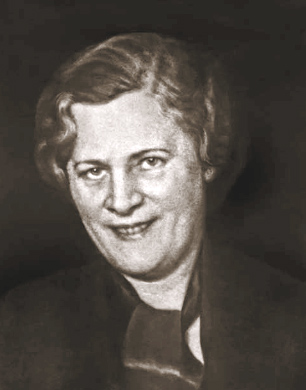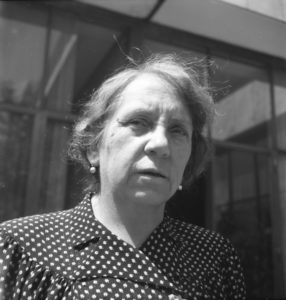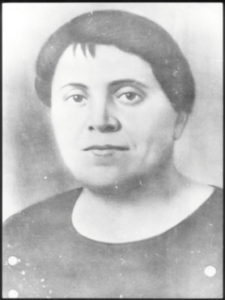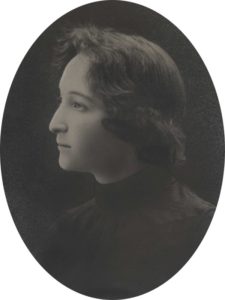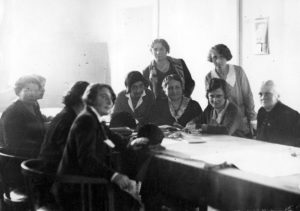by Zhanna Popova
In 1989, the Chief Labour Inspector of Poland created an award that celebrates individuals who contributed to compliance with labour law, achieved improvement of labour conditions, and promoted safe and sanitary labour environment. [1] This award bears the name of Halina Krahelska, a labour inspector active in the interwar period. As one of the key figures who shaped the Labour Inspection in independent Poland, Krahelska is far from being forgotten, but most Polish-language accounts of her life focus strongly on this particular aspect of her work. A broader focus on her life and activism, however, reveals a story of lifelong engagement with labour issues and socialist politics, a story full of transnational ties. This story also offers a vantage point to trace the struggles to create international labour standards and translate those standards into national practice. Her life story also echoes strongly the experience of many other socialist activists who lived and worked in Eastern Europe in the first half of the twentieth century: they lived through repression, incarceration, and exile by imperial authorities; participated and were transformed by revolutions; faced challenges of state-building in the new post-imperial realities.
Halina Krahelska was born in 1886 in Odessa in the family of Jan Sleszyński, professor of mathematics at the Odessa University. Already as a young adult, she became involved in politics, initially as a student of the Higher Women’s Courses and a member of the Polish Socialist Party in her home town. In the years following the 1905 revolution, imperial police repressed militants with exceptional severity, and Krahelska suffered the same destiny as many of her comrades. First arrested in 1911, she spent two months in prison and was forced to relocate from Odessa to Kishinev (today Chișinău). In 1912, Krahelska moved to Kiev and continued her political involvement there. She became a member of the Socialist Revolutionary Party, one of the largest socialist parties in the empire. It was also in Kiev where she started her career as a writer, publishing her first articles in the party newspaper. In 1913, she was arrested once again, and this time the punishment was more severe: after being imprisoned for one and a half years in a women’s prison in Kiev, she was exiled to Siberia for life.
After a long and exhausting journey, Krahelska found herself in a small Eastern Siberian village of Rybnoe. The life of exiles there, as she described in her memoirs, was nothing more but “vegetation”. [2] Confronted with illness and isolation in these first months of exile, Krahelska relied on the help of her husband, Jozef Grabianka, who followed her to Siberia. As a free man, he was eventually able to arrange for them both to move to the town of Kansk in 1916, where they could find jobs and keep in touch with other political exiles. February 1917 revolution allowed Krahelska to return to activism: together with other exiles, both socialist revolutionaries and social democrats, she participated in the local Soviet of Soldiers’ and Workers’ Deputies. After years of underground struggle, this revolutionary experience also offered Halina Krahelska the first opportunity to participate in local politics legally.
In the tumult of the revolution, now free Krahelska and her husband made their way back to the west.[3] Krahelska ultimately settled in Warsaw, where she became Deputy Chief Labour Inspector in 1919. She was attracted to this position as two people she had known from the Polish community in Odessa, Zygmunt Bohuszewicz and Maria Kirstowa, already worked for the Inspection. Martin Müller-Butz, who analysed Krahelska’s memoirs as part of his research on Polish intellectuals’ autobiographic writing, argued that she felt more affinity with the ideas of revolutionary socialism than the idea of Poland’s liberation. He underlined that in her writings, Krahelska put at the forefront the suffering of women of various disadvantaged groups, whom she defined as the true victims and outcasts of the Romanov empire.[4] Indeed, with her arrival to Warsaw, the agenda of Krahelska’s activism appears to have crystallised: she would dedicate the following decades of her work to the improvement of industrial labour conditions, and especially to the wellbeing of women and young workers.
The Labour Inspection in Poland was created in 1919 as an agency within the Ministry of Social Assistance, and the newly appointed inspectors faced a whole array of complicated tasks. Not only were they to bring uniformity to the vastly different labour regulations that were at the time in force in the lands of the former German, Russian, and Austrian partitions, but they also had to shape the entire day-to-day functioning of labour inspection.[5] Throughout the 1920s and 1930s, labour inspectors like Krahelska were responsible for controlling labour conditions in enterprises, resolving labour conflicts by acting as mediators between workers’ collectives and employers, as well as contributing to the development of new labour-related laws and regulations.
As one of the few women labour inspectors, Halina Krahelska would later describe this work as challenging, because women inspectors had less authority than their male counterparts and were often relegated to the so-called “women’s industries” (e.g. textile or tobacco), leaving them unable to inspect the condition of the growing female labour force in the traditionally male-dominated industry branches.[6]
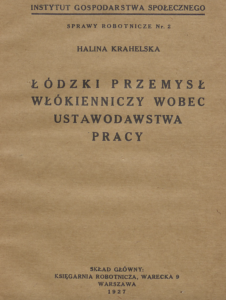
Throughout the 1920s, Krahelska carried out inspections of multiple textile factories in Łódź, and the reports of these inspections were published in her 1927 book “Łódź textile industry and labour legislation” (“Łódzki przemysł włókienniczy wobec ustawodawstwa pracy”). As the textile industry employed large numbers of women, Krahelska focused not only on overall control over safety and sanitary conditions but also on issues that touched women specifically. One of them was the protection of working mothers. Enforcing regulations regarding the creation of nurseries proved a particularly challenging task: many factory owners fought against the obligation of installing nurseries at their factories, regarding them as an unnecessary source of expenses. So strong was the employers’ opposition that Krahelska could inspect some enterprises only with a police escort.[7]
Alongside her work in Poland, Krahelska was interested in the international developments in the domain of labour protection. In 1929, thanks to a fellowship from the Rockefeller Foundation, she was able to visit France, Switzerland, Germany and Austria in order to investigate the situation regarding labour legislations and welfare systems in these countries. During her second appointment as the Deputy Chief Labour Inspector (1927-1931), she also was part of Poland’s delegation to the International Labour Organization.[8]
Her work as labour inspector was deeply imbued with activist ethos, especially when it came to the protection of the most vulnerable groups of workers. As labour inspector, she argued strongly against bureaucratisation and routinisation of inspectors’ work. Appointment of women labour inspectors and extension of their authority was for Krahelska the best strategy of achieving concrete results in improving women workers’ condition.[9] Implementation of these recommendations in the conditions of economic recession and widespread unemployment proved challenging: between 1928 and 1933, staff of the Labour Inspection shrunk. In 1933 there were only six women labour inspectors in Poland.[10]
Reasons for Krahelska’s departure from the Labour Inspection in 1931 are unclear. In the early 1930s, she redirected her efforts towards new projects, mainly focused on research and writing rather than hands-on inspection work. As the country was hard hit by the economic crisis and the number of unemployed grew fast, Krahelska started researching and preserving the experience of those who had lost their jobs. In 1933, together with Stefan Pruss, she published a report of their questionnaire-based survey, entitled “Life of the unemployed: survey research” (“Życie bezrobotnych: badania ankietowe”). At the same time, she cooperated with the Institute of Social Economy (Instytut Gospodarstwa Społecznego) and served as a reviewer in two competitions of autobiographies, one of the unemployed and the other one of the peasants. Collections of testimonies that resulted from these competitions were published throughout the 1930s.
A prolific writer and researcher, Krahelska left behind a vast corpus of texts, ranging from her early publications in the socialist-revolutionary newspaper to fiction and memoirs, from reports about labour conditions of women and youngsters to policy proposals regarding women’s labour protection. These texts, along with official documents and accounts of her contemporaries, also highlight the multitude of practical changes that Krahelska was a driver for or contributed to, ranging from the creation of nurseries to introducing seated work for hundreds of employees of the State Tobacco and Alcohol Monopolies.[11]
The end of Krahelska’s life was tragic: in 1944, Gestapo arrested her in connection to her socialist activities prior to the Second World War. Deported to the Ravensbrück concentration camp, she died of exhaustion there on 19 April 1945, only eleven days before the liberation of the camp.[12]
[1] This award continues to be awarded today (https://www.pip.gov.pl/pl/konkursy/nagroda-glownego-inspektora-pracy-im-haliny-krahelskiej/58974,nagroda-glownego-inspektora-pracy-im-haliny-krahelskiej.html)
[2] Krahelska, Halina. Wspomnienia rewolucjonistki [Memories of a Revolutionary]. Warsaw, 1957 (First edition 1934), 177.)
[3] Jozef Grabianka was involved in the struggle for Polish national liberation upon their return to Poland. He participated in the creation of military units which fought against the German and Austrian occupation of Polish lands in 1918. He died from typhus in 1919.)
[4] Müller-Butz, Martin. Blicke zurück nach Osten: Erfahrungen des Imperialen in Lebenserzählungen der Polnischen Intelligenz Im 20. Jahrhundert. Berlin/München/Boston: Walter de Gruyter, 2019, 224, 225.
[5] The Labour Inspection was eventually overhauled in 1928 following the Decree of 14 July 1927, which “laid down uniform principles for the organisation and practice of labour inspection throughout Polish territory”. See International Labour Office. ‘Labour Inspection in Poland: 1928-1933’. International Labour Review 35, no. 3 (1937): 384–94, 384.
[6] Krahelska, Halina. Praca kobiet w przemyśle współczesnym [Women’s work in contemporary industry]. Sprawy robotnicze 10. Warsaw, 1932, 129-130.
[7] Kozłowski, Tomasz. Inspektor pracy Halina Krahelska [Labour Inspector Halina Krahelska]. Warsaw, 2014, 26.
[8] Ibid., 30.
[9] Krahelska, Halina. Praca kobiet… 125,128-129.
[10] International Labour Office. ‘Labour Inspection in Poland: 1928-1933’, 385, 387.
[11] Krahelska, Halina. Praca kobiet… 131-133.
[12] Kozłowski, 40.
Illustrations:
- Featured photo: portrait of Halina Krahelska, via Wikipedia
- Title page of the book authored by Krahelska, “Łódź textile industry and labour legislation” (“Łódzki przemysł włókienniczy wobec ustawodawstwa pracy”). Warsaw, 1927.

